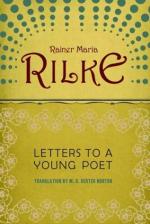
|
| Name: _________________________ | Period: ___________________ |
This test consists of 5 multiple choice questions, 5 short answer questions, and 10 short essay questions.
Multiple Choice Questions
1. How long has Rilke been in the city from which he writes the fifth letter?
(a) Six days.
(b) Two months.
(c) Two weeks.
(d) Six weeks.
2. What aspect of human life does Rilke say is most burdened with conventions?
(a) Love.
(b) Marriage.
(c) Inspiration.
(d) Religion.
3. From where is Rilke's sixth letter written?
(a) Paris, France.
(b) Florence, Italy.
(c) Bremen, Germany.
(d) Rome, Italy.
4. What does Rilke tell the young poet to ask himself regarding his religious beliefs?
(a) Whether the young poet has ever truly found God.
(b) Whether the young poet's beliefs are merely conventions.
(c) Whether the young poet's beliefs are his own.
(d) Whether the young poet truly wants to believe.
5. What does Rilke say is "the only courage demanded of us"?
(a) The courage o be solitary.
(b) The courage to love.
(c) The courage to create.
(d) The courage to be prepared for the unknown or unexpected.
Short Answer Questions
1. What does Rilke imply about losing God?
2. From where is the seventh letter written?
3. To what does Rilke compare people who are preparing for God?
4. At the close of letter seven, what love does Rilke tell the young poet to remember?
5. At the close of the sixth letter, what does Rilke advise the young poet to do in regards to the coming holiday?
Short Essay Questions
1. What advice does Rilke give the young poet for doctoring his sadness?
2. What can be inferred about the mental and emotional state of the young poet from Rilke's reply in letter six?
3. What is Rilke's definition of love?
4. What does Rilke mean when he says that humans have no choice in deciding to be solitary?
5. How does Rilke respond to the young poet's expression of fear that the young poet has lost God?
6. What does Rilke mean when, in letter seven, he says that in the future, femininity will not be "merely an opposite of the masculine, but. something in itself"?
7. What can be inferred about the young poet's feelings toward his own solitude from Rilke's seventh letter?
8. In letter five, Rilke comments on Rome and says that the first few days one is in Rome have "an oppressively sad effect" because everything in Rome is old and looking backward toward the past. How does this sentiment reflect Rilke's life philosophies as he has expressed them thus far in the book?
9. Why does Rilke believe that women are responsible for a future change in humans' approach to romantic love?
10. What is Rilke's view of God?
|
This section contains 901 words (approx. 4 pages at 300 words per page) |

|




